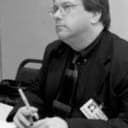Stay in the Loop
BSR publishes on a weekly schedule, with an email newsletter every Wednesday and Thursday morning. There’s no paywall, and subscribing is always free.
Study in A Minor for Voice, Solo Guitar, and Nervous Writer
On becoming a performer

They make it look so easy, don't they? Those actors, musicians, and other performers who seem so comfortable on stage, completely at ease, sure of their own talents and abilities. The thought of making a mistake, forgetting a line, flubbing a tough passage never crosses their minds. They are exemplars of grace, control, and competence as they do their thing up there under the lights.
Of course, nothing is further from the truth. Performing artists are as susceptible to nerves and stage fright as any other human. They simply learn how to deal with it, whether by channeling anxiety into excitement and energy for the performance, suppressing it, or just ignoring it.
I should know, because as a dramatist, I've certainly made performers do and say all sorts of things before live audiences. But it's different when you're the writer, and you sit alone in the back of the theater, pretending to be just another member of the audience.
For the past three decades, that's all I was — just part of the audience, watching my wonderfully talented friends and colleagues performing my words or someone else's, singing songs, doing dances. Until this past Christmas, when I finally got to find out how it feels under the lights instead of in their shadows.
A not-so-innocent remark
It started innocently enough. Early last year, while having dinner with Denise Shubin (founder of Philadelphia's legendary Shubin Theatre), I made some stray comment about my guitar playing — probably berating myself for not practicing enough, something like that — and the next thing I knew, I found myself agreeing to play at Denise's holiday show, which she holds every year in her theater as a precursor to her even-more-legendary holiday party.
Admittedly, I probably hadn't been shanghaied into it. In retrospect, I'd likely subconsciously sorta-kinda-maybe volunteered, particularly after Denise mentioned that this year she wanted to change things up a little. Instead of singers singing, actors acting, dancers dancing, and writers writing, she wanted to have folks venture outside of their known comfort zones: a singer performing a monologue, or an actor singing a jazz standard, for example. In my case, that meant a writer playing guitar. In front of an audience. Which, despite my deeply ingrained introverted nature and tendency to shun the spotlight, is something I'd always sorta-kinda-maybe wanted to do. . .someday. But never have.
It wasn't a question of stage fright, exactly. As an author, I'd done plenty of public readings and book signings, and I'd given talks before university professors and NASA scientists. But still, that wasn't really performing. That was talking about familiar subjects and giving prepared speeches that I'd written mostly in advance, as I would a theatrical monologue. That wasn't performing music before real live people, instead of in front of one or two sympathetic friends.
Now, accidentally on purpose, I had committed myself. Just me, my fumbling, uncertain fingers, and my black Yamaha NTX-700 classical-electric guitar. All alone on Denise's stage.
Well, not quite alone. I managed to convince Denise, a marvelously versatile artist, that it would be an even better idea if I accompanied her on a song or two. We came up with a list of possibilities and quickly settled on two: The Righteous Brothers' "Unchained Melody" and the torch classic "Cry Me a River."
What next?
That put me in something of a quandary, however, especially since the songs were picked only a few weeks before the show. "Unchained Melody" is easy — a simple arpeggio, I'd played it many times before on my own. "Cry," on the other hand, is basically a jazz tune — loose, improvisational, filled with the sort of complicated chord progressions that a self-taught classical guitarist such as myself never encounters. Obviously, I had some work to do.
Thanks to the wonders of the Internet, I managed to find sheet music for several different arrangements of "Cry," even including a solo classical guitar version. And YouTube offered a wide range of performances and interpretations of the tune, ranging from Ella Fitzgerald to Julie London to Diana Krall to unknown amateur and professional musicians of all stripes.
So I had all the material I needed. Too much, actually, because there wasn't enough time to learn a completely unfamiliar arrangement by heart or listen to every available interpretation. But I discovered that somehow I was able to cobble together my own version of "Cry Me a River," made up of pieces of the scores I'd collected and my own musical approximations. The main verses weren't hard, and though I never quite managed to get the bridge right, it was close enough for rock and roll — or, in this case, jazz.
So now I was able to embark on nightly practice of my song arrangements, with one notable part missing: Denise. It's one thing to play a musical accompaniment, quite another to play it as an accompaniment, with the singer actually singing it. Unfortunately, though we'd both originally planned to rehearse several times, it was impossible to actually get together more than once, and that one time was, oh dear, the night before the show.
Oddly enough, though, the evening of the actual performance found me reasonably relaxed. It helped knowing that this was going to be an audience of friends and colleagues, and not a paid, public performance — and that the point was to have fun and celebrate both the holiday and the Shubin Theatre's role in the Philadelphia theatrical community. I was also reassured by the knowledge that I'd done everything possible to prepare, and good or bad, glorious success or miserable failure, I was about to do something that I'd always wanted to do but had never actually attempted.
I'd also taken to heart some advice from my friend Jeff, who'd spent years playing bass in various bar bands. "Everybody makes mistakes on stage sometimes," he told me. "The trick is pretend not to notice and just keep going. If you do that, nobody else will know or care if you mess up."
A star is born
Even with all those good thoughts and bits of advice percolating, however, it still seemed to take an inordinately long time to get through the first few acts of the show. Suddenly, Denise was introducing me, and the next thing I knew, I was staggering from my seat in the back of the theater and down to the stage, picking up my guitar. There was no getting out of it now.
Note for all novice stage performers: stage lights are so bright that you really don't have to worry about all those people watching you. Not only can't you see them, but once you start performing, you forget all about them. For those few minutes, it was really just about Denise and me doing two wonderful pieces of music. First, the most challenging, "Cry Me a River." I played the intro I'd worked out, Denise began singing, and then it was just a natural flowing thing. Yes, once or twice, I fumbled the fingering, I muffed a note. It didn't matter. I kept going, letting the music and Denise's superb singing carry me. Jeff was right. Keep going, don't stop, trust the moment, the music, the flow. Almost before I realized it, we were being applauded, then launched into our second piece, which was the easy one for me, "Unchained Melody."
And then we were done, and there was more applause — enthusiastic, not polite, applause. I put my guitar down and returned to my seat, collecting compliments on the way. Whew. Now I could relax and enjoy the rest of the show.
But as I settled back in my seat, both relieved that I had not made a complete and utter fool of myself and proud that I had actually followed through and done this previously inconceivable thing, I remembered something I'd once read, comparing the process of being professionally published for the first time to the act of losing one's virginity: It's an immensely significant event that happens only once, and once it happens, nothing can ever reverse it or take it away, even if it never happens again. And I realized I'd just achieved a similar milestone: I was now a performing musician. My performance virginity, so to speak, was gone forever.
And like most former virgins, I found myself impatient for the chance to do it again.
Sign up for our newsletter
All of the week's new articles, all in one place. Sign up for the free weekly BSR newsletters, and don't miss a conversation.

 Mark Wolverton
Mark Wolverton